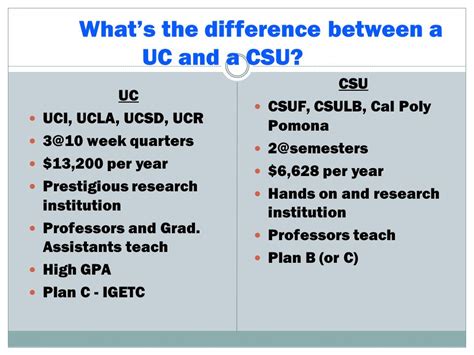Choosing between Cal State and UC universities for higher education is a significant decision that can shape your academic, career, and life trajectory. Both systems offer distinct advantages and disadvantages, and it’s essential to understand the key differences to make an informed choice.

Key Differences
Academic Rigor
UC universities generally offer more rigorous academic programs, with higher admissions standards and a focus on research and scholarship. Cal State universities, on the other hand, emphasize teaching and applied learning, with a more accessible curriculum for students of varying backgrounds.
Research Opportunities
UC universities are known for their extensive research programs, attracting grants and funding from prestigious organizations. This provides students with opportunities for internships, research collaborations, and exposure to cutting-edge advancements. Cal State universities offer more limited research opportunities, but they provide grant-funded programs for faculty and students.
Faculty Quality
UC universities often have higher faculty-to-student ratios and recruit world-renowned professors in their respective fields. Cal State universities typically have larger class sizes and a more diverse faculty, including industry professionals and experienced educators.
Student Life
UC campuses tend to be larger and more traditional, with a vibrant student life that includes sports, clubs, and Greek organizations. Cal State campuses are generally smaller and more commuter-focused, with a less formal social scene.
Location
UC campuses are strategically located in major metropolitan areas, such as Los Angeles, Berkeley, and San Diego. Cal State campuses are spread throughout the state, with many located in less urban settings.
Cost and Financial Aid
Tuition and Fees
UC universities have significantly higher tuition and fees compared to Cal State universities. In 2021-2022, the average annual tuition for a Cal State undergraduate was $6,792, while the average for a UC undergraduate was $14,184.
Financial Aid
Both Cal State and UC universities offer financial aid to students based on need and merit. UC universities have more generous scholarship and grant programs, but they are also more competitive. Cal State universities offer more tuition waivers and fee reductions for low-income families.
Career Outcomes
Job Placement
UC graduates report higher job placement rates than Cal State graduates. UC Berkeley, for example, has a 93% job placement rate within six months of graduation, while Cal State Los Angeles has an 86% job placement rate.
Salaries
UC graduates earn higher starting salaries than Cal State graduates. According to PayScale, the median starting salary for a UC Berkeley graduate is $70,000, while the median starting salary for a Cal State Los Angeles graduate is $55,000.
Choosing the Right Fit
The best way to choose between Cal State and UC is to consider your individual needs, motivations, and aspirations.
Cal State may be a better fit if you:
- Prefer a more accessible and practical education
- Want to save money on tuition and fees
- Plan to live and work in California
- Value diversity and inclusivity
UC may be a better fit if you:
- Seek a challenging academic environment
- Desire extensive research opportunities
- Aspire to a career in academia or research
- Prioritize prestige and reputation
Key Considerations
Pain Points:
- Cal State: Limited research opportunities, larger class sizes, less vibrant student life
- UC: High tuition costs, intense academic pressure, competitive funding landscape
Motivations:
- Cal State: Practical education, affordability, teaching focus, career readiness
- UC: Prestige, research opportunities, rigorous academics, global reputation
Effective Strategies:
- Research: Visit campuses, talk to current students and faculty, and compare programs of interest.
- Evaluate: Consider your academic strengths, career goals, and financial situation.
- Apply early: Apply to multiple schools and meet application deadlines to maximize your chances of admission.
- Maximize financial aid: Explore all scholarship, grant, and loan options to reduce your financial burden.
FAQs
1. Which system is better?
- There is no one-size-fits-all answer. The best system for you depends on your individual needs and goals.
2. How do I decide which school to apply to?
- Research schools, consider your motivations and pain points, and align your applications with your aspirations.
3. Is it easier to get into Cal State or UC?
- Cal State universities generally have lower admissions standards than UC universities.
4. Is it worth the extra cost to attend UC?
- The higher cost of UC may be worth it for students seeking intensive research opportunities, higher salaries, and a more prestigious degree.
5. Can I transfer from Cal State to UC?
- Yes, it is possible to transfer from Cal State to UC, but it requires meeting specific academic criteria and transfer agreements.
6. How do I maximize my chances of admission to UC?
- Maintain a high GPA, take rigorous coursework, participate in extracurricular activities, and develop a strong personal statement.
7. What are the differences in student support services?
- Cal State universities offer more academic advising and support services for first-generation college students and students from underrepresented backgrounds.
8. Are there any online or part-time programs available?
- Both Cal State and UC universities offer a variety of online and part-time programs for working adults and students with other commitments.
Conclusion
The choice between Cal State and UC is a significant one that can have long-lasting implications for your education and career. By carefully considering the key differences, exploring your motivations and pain points, and developing an effective strategy, you can make an informed decision that aligns with your aspirations and future goals.
